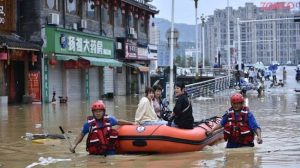Economies already under stress respond more strongly to weather events like heat waves, river floods and tropical cyclones, a new study shows.

A global economic crisis as during the Covid-19 pandemic strongly amplifies the price increases private households experience from the impacts of weather extremes, a team of researchers from the Potsdam Institute for Climate Impact Research (PIK) finds.
The price impacts tripled in China, doubled in the United States and increased by a third in the European Union.
“The unprecedented societal interruptions during the Covid-19 pandemic of 2020 and onward took their toll on economic activity. Lockdowns disrupted supply chains and caused economic losses with implications for private households,” lead author, Robin Middelanis from PIK, explains. “Global stress like this reduces the economic capacity to cope with additional shocks from weather extremes that put even more pressure on already stressed societies.”
For an individual climate disaster, impacts from local production losses can be flexibly reduced to a certain extent by the support of unaffected production sites in the economic network. Compensation mechanisms like this become more difficult when the world economy is stressed as a whole. The costs for households increase as products run short and become more expensive.
For their study published in the journal Environmental Research Letters, the researchers analysed two scenarios, framed as a “stressed” economy and a counterfactual “unstressed” economy with full economic capacity.
Under both scenarios, they simulated indirect economic impacts from direct local economic shocks caused by climate extremes like heat stress, river floods and tropical cyclones. For this, the interaction of more than 7,000 individual producing sectors and regional consumers connected through over 1.8 million trade links was computed on a daily time scale for the years 2020-2021. The study focuses on the resulting indirect price effects on private households for the three largest economies, the United States, China and the European Union.
“It is as easy as it is dangerous to underestimate the economic impacts of increasing weather extremes. As they will intensify under global warming they will coincide with non-climate-related economic crises and that is a threat,” stresses Anders Levermann, head of the Research Department Complexity Science at PIK.
“Our study shows that mitigation of and adaptation to climate risks not only imply the protection of vulnerable regions. Moreover, increasing the resilience of trade relations to cope with shocks originating in other regions is of vital importance to our societies,” adds Levermann.
